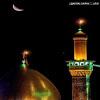
Today, the 25th of Rajab, is that tragic day in Islamic history on which in the year 183 AH (799 CE) the corpse of a venerable descendant of Prophet Muhammad (SAWA) was left for public view on the bridge across the River Tigris in Baghdad near the caliph's palace, with a long scroll 'attested' by court-mullahs claiming there was no sign of any foul play on the body of the person who emerged lifeless from imprisonment.
The question is: Why was he imprisoned in the first place; and for what reason did the caliph brought him all the way in chains and fetters from his hometown Medina in the Hejaz to Iraq – first Basra and then Baghdad? Moreover, did the ploy of 'attestation' absolve the regime of its cardinal sin?
The answers are obvious, in view of the innocence of Imam Musa al-Kazem (AS), who reigns supreme today all over the world from his grand mausoleum in the capital of his tormentor, Haroun ar-Rashid, whose rotten bones that lie at the feet of the son of his victim in Mashhad in Khorasan, rattle every time pilgrims to the shrine of Imam Reza (AS) invoke God's curse on the hero of the Arabian Nights depravities.
When Haroun was informed in the midst of his drinking bout that his henchman Sindi bin Shahak had carried out his orders to poison to death the 7th Imam of the Prophet's Ahl al-Bayt, he felt relieved. He made no secret of his joy, for he used to tell those of his courtiers that dared to ask him the reason behind imprisonment of such a pious soul who only prays and fasts, that it is vital for the survival of the Abbasid caliphate.
It is obvious that Haroun, like Yazid and all other harebrained murderers of the Imams of the Ahl al-Bayt, could neither prolong his personal rule, nor could safeguard the scandalous institution called the caliphate that owed its birth to the disgraceful gathering of Saqifa Bani Sa'da which was convened in violation of God's commandments in the Holy Qur'an and the numerous hadith of the Prophet, in order to deprive the divinely-decreed vicegerent, Imam Ali (AS), of his political authority.
Leadership in Islam is not the prerogative of the unprincipled or the immoral, however shrewd and crafty they may think they are, or the wealth and the military might they might accumulate.
As a matter of fact, quoting his illustrious forbear, Imam Ali (AS), the 7th Imam, whose indomitable spirit neither persecution nor imprisonment could break, has said in this regard to his to his prominent disciple, Hisham bin Hakam:
"O Hisham! The Commander of the Faithful has said: No one should lead a number of people without enjoying three qualities. He should be able to provide answers for every question posed to him. He should be able to speak plainly when other people fail to do so. And he should be able to offer the counsel, which benefits people. He is certainly a fool who lacks these three qualities but seeks the leadership.”
During his 35-year long Imamate that began when he was 20-year old, the Prophet's 7th Infallible Heir, whose epithet "Kazem" means "Restrainer of Anger", encountered four such fools who masqueraded as caliphs to mislead the ummah – Mansour Dawaniqi, Mahdi al-Abbasi, Hadi al-Abbasi, and Haroun.
These Abbasid Pharaohs subjected the Moses (Musa) of the Prophet's Household to intermittent bouts of imprisonment that totaled 14 years, of which the last two years were continuous and ended in his martyrdom. The Imam, however, never regarded his incarceration as a calamity. In fact, he considered imprisonment to be a blessing in disguise, as these periods of solitude, away from the burden of public affairs, provided him more opportunities to spend his entire time in prayer, fasting and other acts of worship. This is evident by his supplication in the Divine Court which reads:
“O God! You know that I have always wished that you put me in an ideal place where I can say your prayers and You have granted my wish. I praise You and I am grateful to You.”
This is indeed further proof of the immaculate position of Imam Kazem (AS), who as the ocean of purity had such an electrifying impact on a morally-loose woman Haroun contrived to send to his cell in a vain bid to defame him that to the horror of the jailors she was transformed into a picture of prayer and worship herself, to the extent that she preferred being killed rather than return to her immoral past.
This brief newspaper column is unable to do justice to the Bab al-Hawa'ej, who continues to grant boons to the needy that knock at his threshold. I end it with another gem of a saying from the person whose legacy is very much alive today long after caliphs and their dubious claim to power have vanished from scene, as is evident by the millions who have converged this day on his mausoleum in Kazemayn from all over Iraq and form other parts of the world to pay homage to him:
"The light of the body is in the eyes. If the sight is luminous, the whole body will be bright. The light of the spirit is in the brain (mind). If a person is (really) intelligent, he will acknowledge his Lord (God). If he acknowledges his Lord, he will clearly see his religion. If he ignores the affairs of his Lord, he will be having no religion. Like the body that does not live without a living soul, the religion does not live without true conviction. True conviction is proved only through the mind."
source : irib













